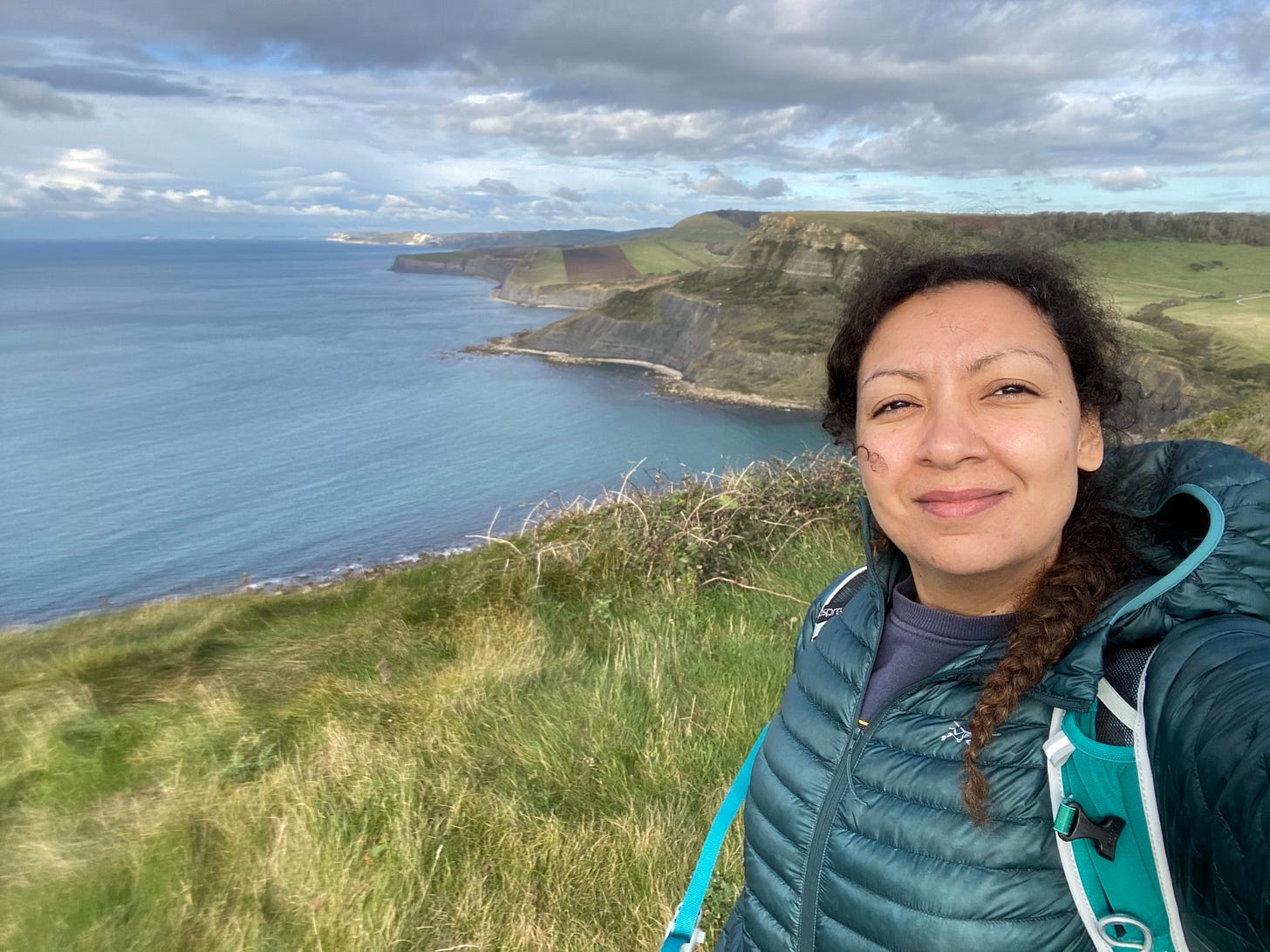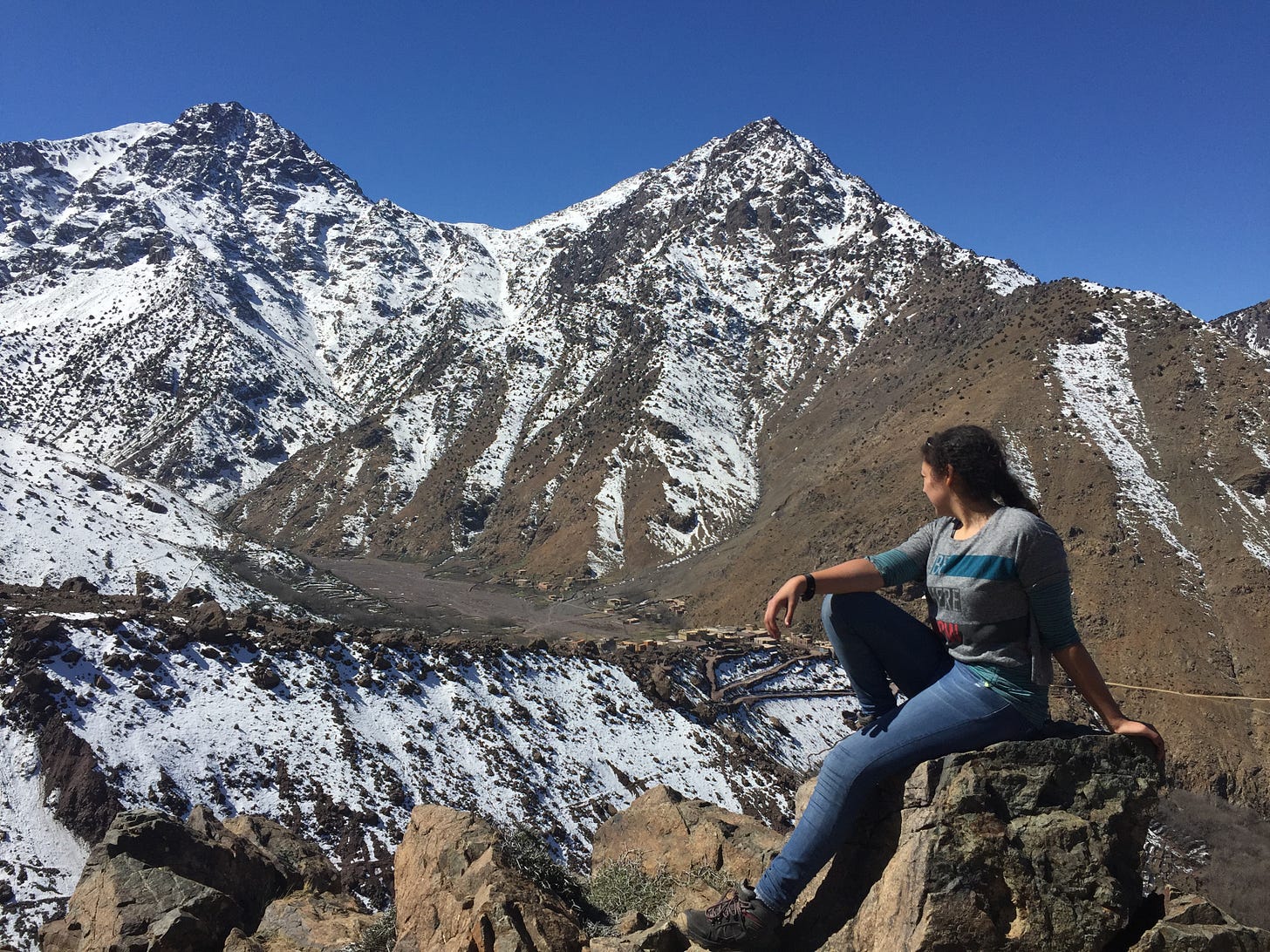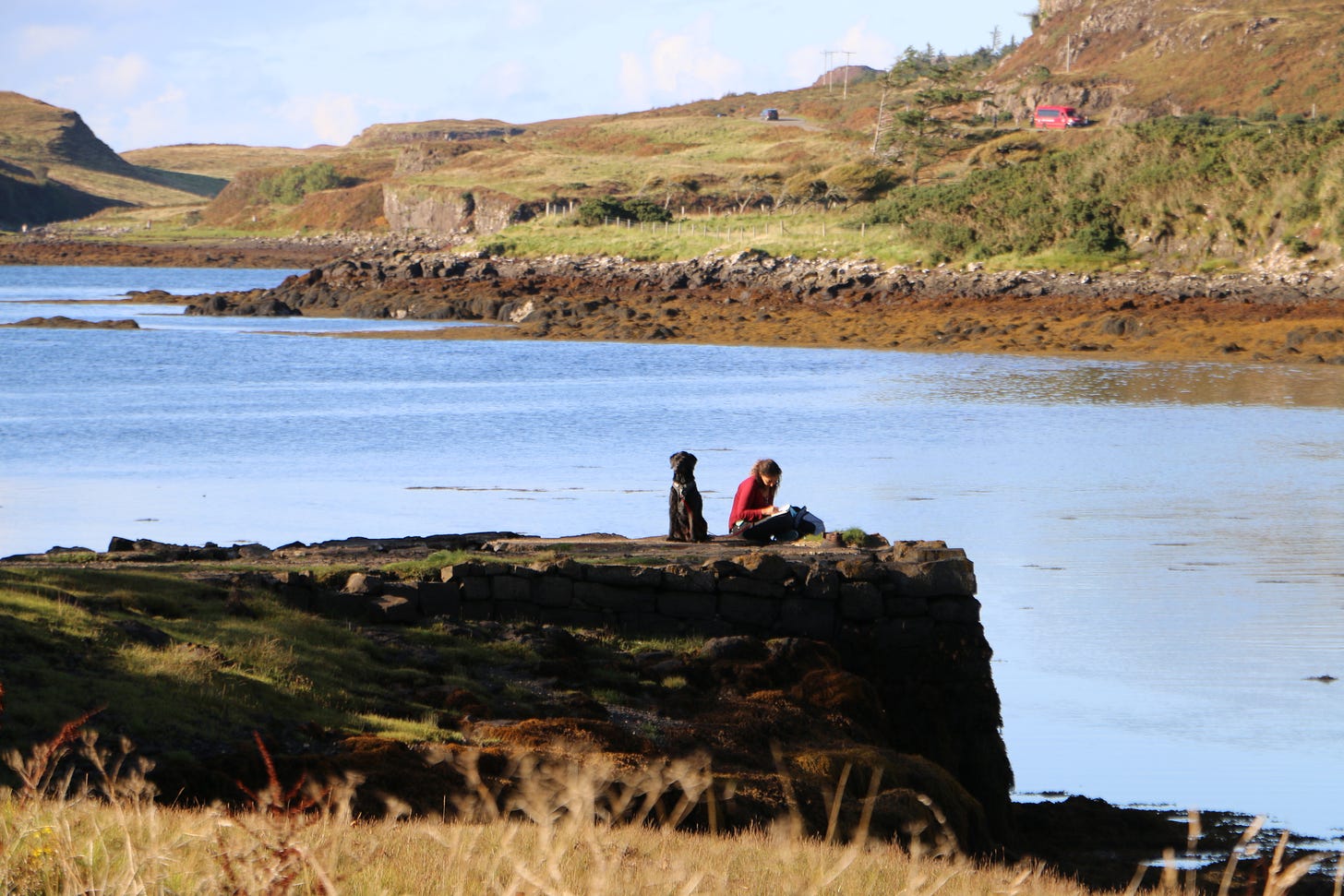“I don’t need to do all the work, I just need to find my role.”
An interview with activist & founder of All the Elements Soraya Abdel-Hadi, who lives in Hampshire
“It helped make me feel like I was doing something useful, and it was where I realised one of my strengths was bringing people together and supporting them to make change. As in, I don’t need to do all the work, I just need to find my role in supporting people.”
I first met Soraya at Patagonia’s ‘Protect our Ocean’ event this summer (thanks for the intro
) and was really interested to hear about the work she’s doing to tackle the diversity problem in the outdoors, through her community interest company, All the Elements.I was at the Blue Earth Summit in Bristol this week and the historian Professor David Olusoga did a great talk linking Britain’s cultural history and colonial legacy to the outdoors. Just 1% of visitors to UK National Parks are from ethnic minorities, yet those groups make up 14% of the population, which is clearly not right given how much we know about the mental and physical benefits we get from spending time in nature.
Soraya and I talk about channelling climate despair into action, not realising people saw her as an outsider, and her discomfort at the idea that pushing for more diversity in the outdoors should always be linked to environmental action. I hope you enjoy our chat.
Hey Soraya, how have you been? Have you been out hiking much lately?
I hiked up Pen y Fan [in Bannau Brycheiniog, Wales] with a friend recently. But I’m actually relearning how to connect with the outdoors at the moment. My dog died last year. If you’d asked me before that happened, I would have said I’ve been out walking daily, connecting with nature, and enjoying the outdoors. But now I can’t walk in most of the places I would have walked with him and, given that we did a lot of walking during Covid, that’s a lot of places.
Oh, I’m sorry to hear that…
I’ve been doing lots of different activities though. I went on a kayaking day course recently, and I built my own bamboo bike, which last year I used to do the Way of the Roses, a 170-mile coast to coast route from Morecambe to Bridlington. I’d only ever cycled 10 miles before that, so it was a real baptism of fire. I also want to learn how to kitesurf and freedive.
As a kid I was heavily into horse riding. I would still be if it wasn’t so expensive.
When did you start working in sustainability?
I wanted to do a business course that incorporated nature and how nature and humans fit together so I did the One Planet MBA at Exeter University which was in partnership with the WWF. It was life changing and I learned so much, but it was also like opening a can of worms, in terms of realising how much we had to do.
In our first session, they showed us the [Chris Jordan] picture of the dead albatross chicks with plastic in their stomachs. I remember crying and feeling ridiculously overwhelmed as to how I’d ever make a difference.
I did some sustainability consulting for start-ups, and then went on a canoeing trip with Dave Cornthwaite and Emily Penn called Exploring Mindset. Emily asked if I was interested in volunteering for them at eXXpedition, which she founded to run all-women research-based sailing trips to help people understand the true scale of the ocean plastic problem.
I went on to become their first employee as the operations manager, and I loved it, amazing people doing amazing things.
Did that work help take away some of the despair you’d felt after seeing those albatross pictures?
I don’t know if it took away the despair, but it helped make me feel like I was doing something useful, and it was where I realised that one of my strengths was bringing people together and supporting them to make change. As in, I don’t need to do all the work, I just need to find my role in supporting people.
A lot of the people I work with through All the Elements are doing the work they’re doing without any resources or support, while still doing all of their other life things.
There is something very pure and amazing about that, but my work is about saying: “You should be getting paid and resourced,” and: “How do we make that happen, so you can create more change and do even more amazing things?”
Could you give some examples of who you’re trying to help through All the Elements?
It’s for everyone creating change on diversity in the outdoors. The majority of the people and the core of our network is the grassroots, so individuals who might be activists or researchers or those running a community group. But they could also be working in a National Park or an outdoor media organisation, it doesn’t matter what role they’re taking or what skills they’re using, it’s about their intention and wanting to create change.
All of our stuff is free, I’ve done about 400 one on one calls now, and every single event that we’ve run is free, in fact for the in-person events we often pay for people to attend.
Growing up in the countryside, did you feel like an outsider?
I come from an outdoor background but also a fairly privileged background which I don’t think I realised when I was younger. I grew up in a predominantly white area, so I always had an awareness that I was different to other people, but I never felt hugely like an outsider.
I’ve been into the outdoors since I was a toddler and the idea of not doing that seems ridiculous to me, everyone belongs in the outdoors. But when I was in the adventure community and going to places like the Royal Geographical Society, people would ask me about diversity all the time. To start with I wasn’t necessarily linking to the fact they thought I wasn’t part of the community, but I had people come up to me and say things like: “How do we get more people like you here?”. I’d be thinking, I’m probably of a more similar background to you and if I knew what the problems were I wouldn’t be here, so that was quite confronting.
So, I went and did my own work. I’ve always been interested in social justice and my own background and heritage and wanted to be more connected to it, but I also didn’t know much about people of colour in Britain as a whole, so I did lots of reading and research and now at least when people ask me the question, I can give a better answer.
Does the question of how we make the outdoors more diverse while promoting environmentalism come up a lot?
Yes, especially in regard to funding, as lots of funding now is linked to environmental protection. That’s great, but what it requires is saying that you’re going to get underrepresented people into the outdoors and that will make them want to protect the environment.
It drives me mad because you’re putting another barrier in place by saying you can only access the outdoors if you’re going to be a climate activist or protect the environment. No one else has to jump over that barrier to be allowed in outdoor spaces.
We’re all supposed to have equal access to outdoor spaces and feel equally like we belong in those spaces, to get all those physical and mental health benefits. Barriers can be soft, such as: “Am I going to be welcome here?” and “Do I have the knowledge to keep myself safe?” or hard, such as: “I don’t have transport to get there, and I live in the middle of a city” or “I don’t have the money for outdoor kit”.
That person who has all those things already doesn’t have to prove themselves to have access to the outdoors. That said, the more people you can get into the outdoors the larger the number of people there are who will want to protect it.
Read more about All the Elements here.
My good friend Phil Young is also doing amazing work in this space, through The Outsiders Project, which I sometimes write pieces for.
Other news:
As I mentioned above, I’ve been at The Blue Earth Summit in Bristol this week. I saw a lot of really inspiring talks, caught up with good pals, old and new, and came back with a notebook full of ideas. I also ended up on a panel talking about how creatives can push a more purpose-driven agenda in their work (clue: by not shilling for car brands) and even though I’m not the world’s best public speaker I think it went ok. Thanks to my fellow panellists Aisha Ayoade from Futerra, Alex Hill from SHARE Creative, and Chris Dooley from JC Decaux, and to the mighty Hannah Bailey for setting it up.
At the event, I got some special tape from the Patagonia ‘Worn Wear’ repair station to fix my beloved 10-year-old Finisterre waterproof. On that note, I wanted to do a little shout out to Bodyline in Newquay, who have just fixed a few wetsuits for us (fabric tears, zip broken…) and given them a whole new lease of life. It’s such a slick operation and the staff are lovely, I can’t recommend them enough.
And I enjoyed this podcast on the surf legend Miki Dora by the New Yorker writer Dana Goodyear. His story is definitely a lot darker and depressing than I’d realised.
Please fwd this newsletter to anyone who you think might be interested & if you have any story tips on any of these themes pls get in touch.








Soraya makes such an interesting point about the at times misguided focus on sustainability, and how this can be a barrier. I'm beginning to think the entire way the outdoor industry talks about climate and sustainability is really ineffective and inward-looking.
Thank you for your chat. Sorry to hear about your doggy, never not sad to loose a companion.
I like the way Patagonia strike the word sustainably from the ethos, and marketing. One of the fist clothing companies to self identify greenwash.